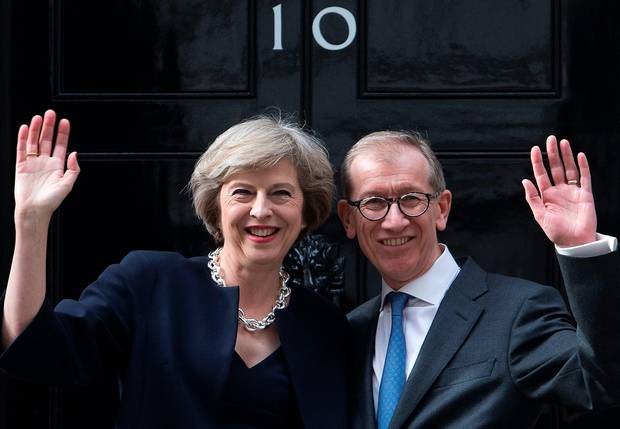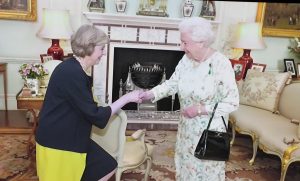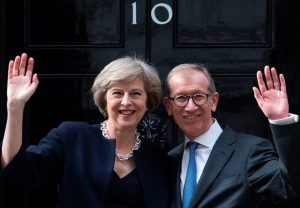
Theresa May – new Prime Minister with a new name for the party.
Theresa May born in 1956 is the new Prime Minister of Britain. Seen here with her husband at her new home in Downing Street, May had made a speech about her newly elected position calling her party the “Conservative and Unionist Party” stressing heavily that she supports those on low incomes who are struggling to bring up families as well as those who are financially stable and have few money worries.

May meeting the Queen
This could be seen by some as wooing Labour voters as a tactic to command support. If so, this is a strong and caring method of calming the troubled waters of both left and right politics at present. May has a long history of hard work, and commitment to her goals and has been previously singled out of hundreds of candidates as someone who would go far. She recognised Thatcher in the past as someone who was not interested in gender, just in ability and achievement. Since Thatcher, there have been many female Prime Ministers around the globe, although of course Mrs Ghandhi and Golda Meir preceded her. May’s husband Philip has always supported her and she has been quoted as saying “so have faith. Anything is possible if you work hard to achieve it”.
She wants to fight injustice and command a radical team of ministers to run her cabinet forcefully and successfully. Boris Johnson is now Foreign Secretary and Theresa May has said: “Together we will build a better Britain”. Johnson has been in New York – his birthplace and wrote of Hilary Clinton – “she had died blonde hair, pouty blue lips and a stare like a mental health nurse”. Visiting Israel he lost support on controversial remarks and later waved the flag in Beijing for the Olympics.
How will Theresa May deal with the Mayor of London passionately for Remain? Housing will be a massive issue, and the Mayor says people cannot be used as bargaining chips regarding this issue. May has got to understand and realise the power of local government in order for them to interact successfully with her. She is the second longest Home Secretary and many people in politics know her to have blocked computer hackers, deported Islamic extremists and frozen the bank accounts of Russian criminals. All very impressive stuff.
Meanwhile, Jeremy Corbyn is being challenged by Angela Eagle. Corbyn wants to unite Labour supporters together and fight disruption within the Labour supporters who saw him raised to Leader. He has a lot of support from the Oxford community which of course comprises many who have done seriously demanding courses up to and beyond PHD level some of whom have extremely prestigious positions in government.
Theresa May sprung a surprise by making top Brexit campaigner Boris Johnson foreign secretary. May replaced David Cameron after he stood down following June 23 vote to leave the European Union, which sparked several weeks of political turmoil and volatility on the financial markets. Johnson led the Brexit camp to victory, antagonising several EU leaders in the process. May also quickly and brutally dispatched off finance minister George Osborne, Cameron’s closest ally, and appointed former foreign secretary, Phillip Hammond to the job instead. Eurosceptic former ministers Davis Davis and Liam Fox were appointed respectively as Brexit negotiator and minister for international trade.
May had a phone call with German Chancellor Angela Merkel, who invited her to visit, followed by calls with the French and Irish leaders, according to a Downing Street Spokeswoman.

